
This is part six of this feature: Part 1 | Part 2 | Part 3 | Part 4 | Part 5
For all of the history with Scotland, the Germans were England’s real ‘old enemy’. Hosting a tournament again precisely 30 years after beating West Germany in the World Cup final didn’t help to quell echoes of footballing history, but the echoes were largely tremors after July 30, 1966.
Of the next seven World Cup tournaments, England had reached only four and been sent home twice by the Germans, at Mexico 70 and Italia 90 – and the latter was the undisputed high point of England’s “30 years of hurt”.
The Three Lions whimpered from mediocrity to misery while Die Mannschaft rolled serenely on: World Cup ever-presents, twice winners, twice runners-up. This was also their sixth semi-final in seven European Championships.
In those 30 years, the English had met the Germans – either West or reunited – 13 times. They’d lost nine of those games and won only two: a rain-soaked Wembley friendly in 1975 against an experimental side as the world champions rebuilt, and a literal warm-up in Mexico City in June 1985 against an outfit two days off the plane and collapsing in the rarefied atmosphere.
Those once-per-decade meaningless wins did nothing to undermine the Gary Lineker aphorism that, “Football is a simple game: 22 men chase a ball for 90 minutes, and at the end, the Germans win.”
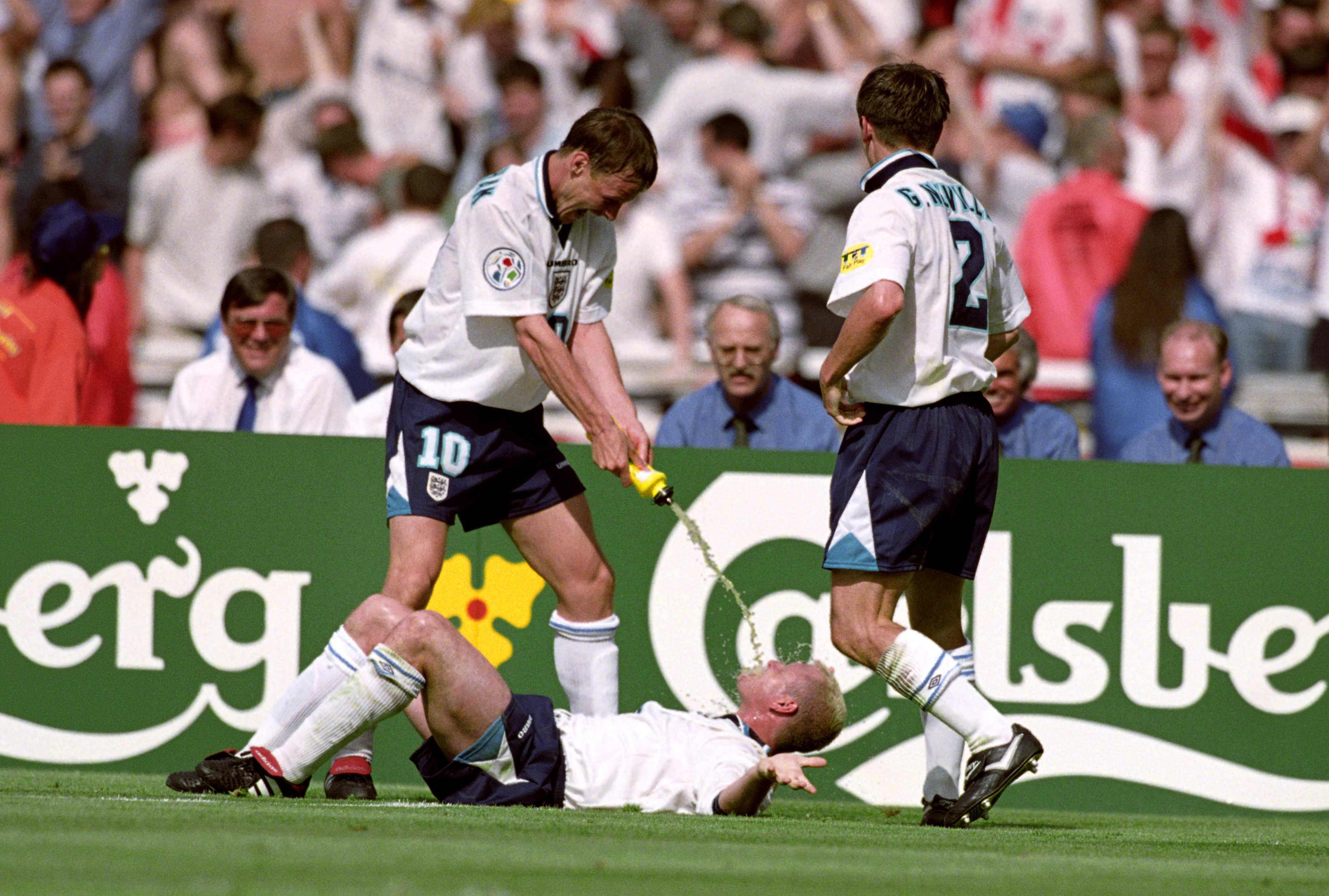
GUIDE Watch Euro 96 on ITV: Full fixture schedule and England live stream details
There was – still is – another overlay with Germany: the conflict still known by its definite article. ‘The war’. Events of 1939-45 loomed larger in 1996, and not just because they were so many years closer. Many football fans – quite a few footballers, in fact – had grandparents who’d gone through it, and therefore parents who’d been brought up with it.
So, as the Germans appeared once again in the path of historical narrative and Europhobia in parliament, the baser elements of the press saw fit to parade tired old tropes of ‘hilarious’ racism.
With Kelvin MacKenzie having left The Sun, the chief cheerleader for tabloid idiocy was MacKenzie’s old showbiz reporter, Piers Stefan Pughe-Morgan. Having dropped a barrel from his surname, Morgan had barged his way into editing the Mirror from 1995, and, trailing at the newsstand, he was using Euro 96 to court sales from the sort of people who liked their papers to call a Scot a ‘Jock’, a Spaniard a ‘dago’ and a German... well…
We were warned. On Monday, June 24, The Guardian’s David Lacey noted that “no doubt the next 72 hours will see certain sections of the media resorting to the kind of childlike jingoism that should have gone out with Biggles.” That morning, the Mirror belched: “There is a strange smell in Berlin... and it’s not just the smell of their funny sausages.”
By semi-final day, Morgan had gone full tin-hat – literally. With Stuart Pearce and Paul Gascoigne mocked into Second World War helmets, his front page bellowed: “ACHTUNG! SURRENDER! For you Fritz, ze Euro 96 Championship is over.”
Similar headlines were on the inside. Morgan contributed an editorial parodying Neville Chamberlain’s declaration of war. He wanted his minions to drive a tank to the offices of Bild, and to drop leaflets from a Spitfire over the Germans’ training ground.
But Morgan’s tin hats were tin-eared. The Foreign Office condemned the move, the Press Complaints Commission were hit with hundreds of complaints, and a cross-party motion was tabled in the Commons.
As Terry Venables noted: “It’s gone beyond rivalry in a football match and it’s not funny. The rest of Europe is envying the wonderful atmosphere we’ve created, so let’s not spoil it.”
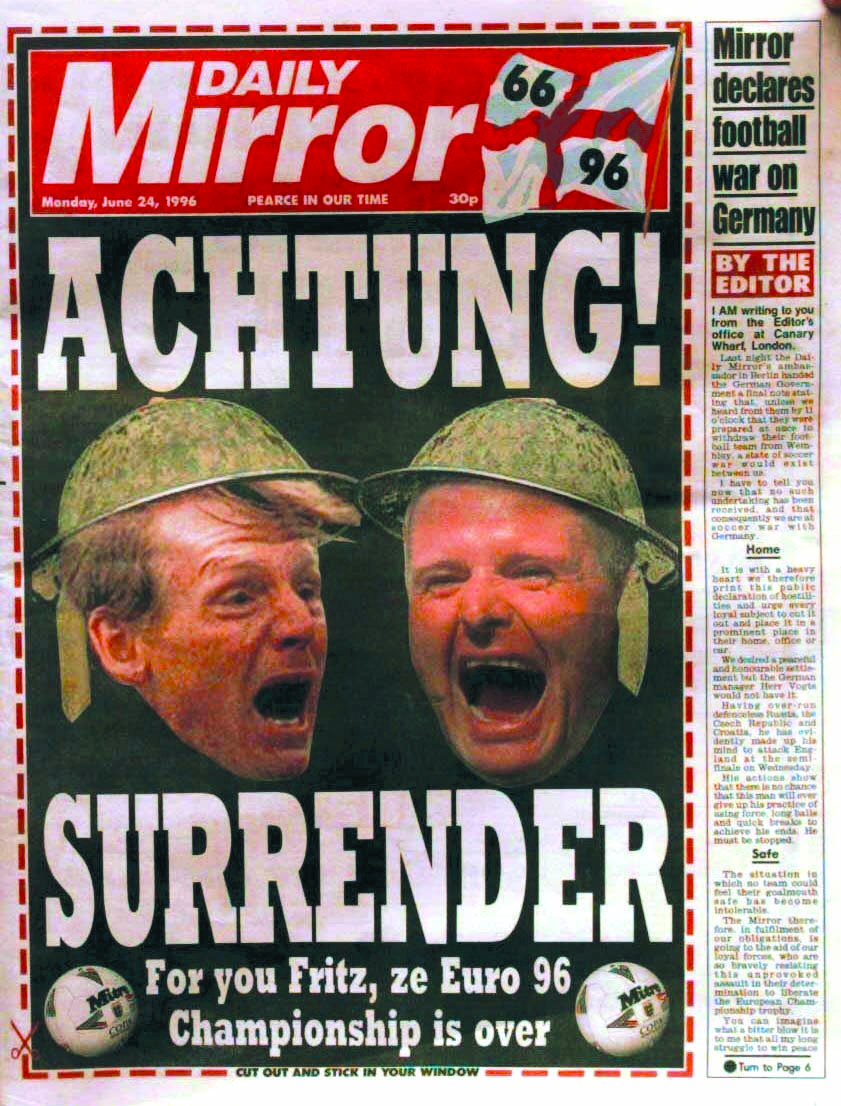
Oh so close
“Hello again. Glad you’ve tuned in. You’ve obviously heard that there’s a football match tonight.”
The dulcet baritone of host Des Lynam introduced the BBC’s coverage in his usual style of knowing understatement, despite sitting opposite a grinning Jimmy Hill in a George Cross bow-tie.
Sadly for Jimmy, England and everybody outside Umbro’s kit sales department, Sir Bert Millichip lost the coin toss and England, for the first time in the tournament, were forced to wear an “indigo blue” that looked quite a lot like grey.
Also suffering an oh-so-’90s kit malfunction was crooner Paul Young, who just about got through the national anthem in an off-white suit not unlike those worn on the same pitch six weeks earlier by Liverpool.
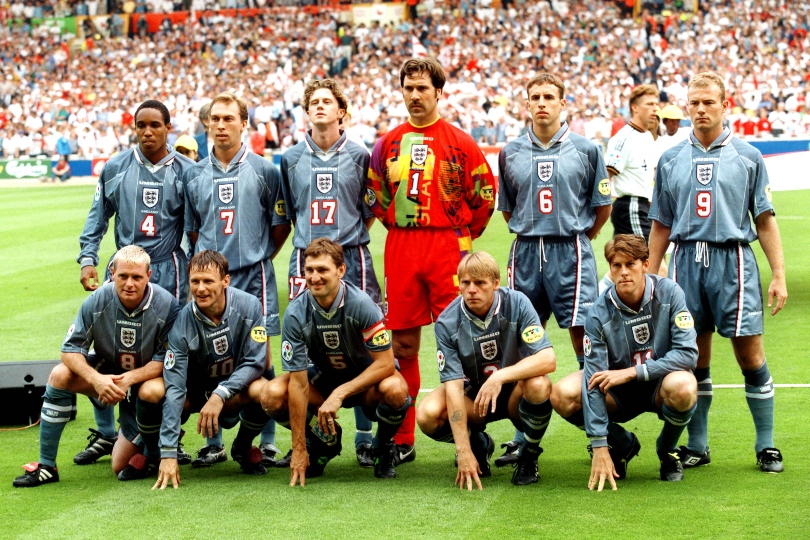
As with the quarter-final, Venables would have to do without one of his magnificent XI.
Carded against Spain, Gary Neville had succumbed to the same second-yellow suspension that had previously done for Paul Ince – who had his own worries. Though Ince had now served his suspension, England’s only continentally-based player (he was at Inter) wasn’t sure he’d get back into the side.
“You start wondering: ‘Well, they’ve just got through to the semis and I didn’t play in the quarters, so am I going to play in the semis?’” Ince confesses to FFT. “I started having a little panic! But of course I had to play. You can’t have Incey out of the semis!”
Although Gary Neville’s brother, Phil, was a fraternal like-for-like option, Venables opted for a back three. Pearce and Gareth Southgate would flank Tony Adams, while David Platt stayed in midfield with Ince and Gascoigne.
It was certainly fluid – an XI designed to suit all occasions. “Our system was flexible,” Venables explained in specific relation to the semi-final. “If they played with two men up top, we would play three at the back, but if they’d gone with three then we would have had four in defence. I knew I could respond at any stage.”
In five matches, the England manager made several tactical tweaks but just two changes to his starting line-up, and those were enforced through suspensions.
Germany had problems of their own to solve. With strikers Jurgen Klinsmann and Oliver Bierhoff injured, Berti Vogts turned to a frontman who was knocking on 34, and whose four previous goals in 21 caps had all come in friendlies. Thus far, he had been best known as a surname-based punchline: Stefan Kuntz. If ever there was a time to beat Germany, it was now.
But, as Alan Shearer told FFT, “We didn’t dwell on the previous stuff. We didn’t think of old encounters. We felt that we could go on and win this.”
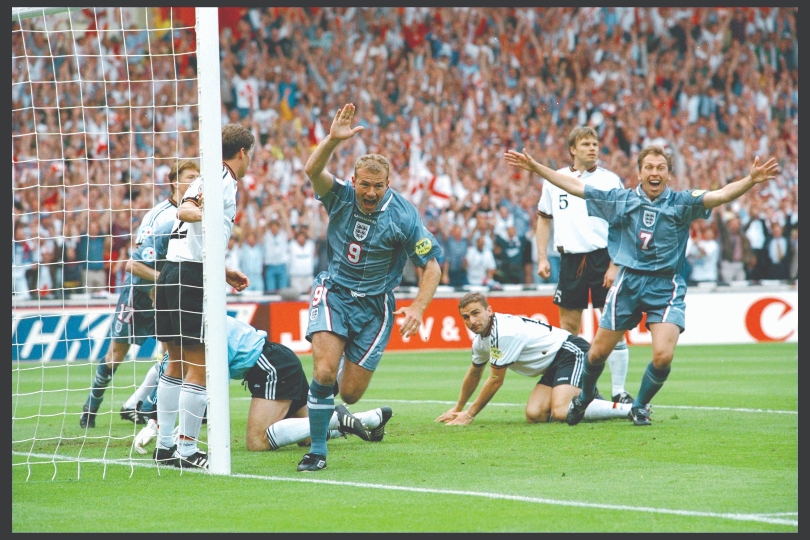
Not for the first time in the tournament, England started like a team full of belief.
Within the first two minutes, Ince had announced his return to the line-up with a stinging 25-yarder that Andreas Kopke was glad to parry over. Then Adams flicked on Gascoigne’s corner for an unmarked Shearer to nod home his fifth goal in five games at Euro 96, ultimately earning him the Golden Boot. There were 133 seconds on the clock.
Alan Shearer vs GermanyWednesday 26 June 1996Euro 96 Semi FinalEngland 1-1 Germany pic.twitter.com/p94abWAiwuJune 28, 2017
In 53 matches since Euro 92, Germany had only twice gone two goals behind (to Brazil and to Jack Charlton’s Republic of Ireland), and they were in no mood to bag the hat-trick. Probing around the edge of the area, Andreas Moller, captain and Italia 90 survivor, played in centre-back Thomas Helmer past Southgate, and Pearce didn’t notice Kuntz slipping behind him at the far post to level. It was the stopgap striker’s first international goal in 16 games since September 7, 1994 – the same day Shearer’s now-forgotten drought had started.
With both sides playing five in midfield – Germany arguably playing six, including Matthias Sammer, Europe’s last great libero – the semi-final might well have become tensely territorial. Yet, for all their necessary solidity against Spain, Venables’ XI were an attacking assortment at heart. This was a team that supported its two strikers with McManaman, Anderton and Gascoigne, as well as Platt breaking forward in the manner that had brought him 27 goals in 62 caps – three behind Shearer’s 30 from 63 and just two fewer than Frank Lampard’s 29 in 106.
While each team had spells in command, the semi-final rarely spent much time as one-way traffic in either direction. Germany ceded the initiative to England by half-time, with Sheringham and Shearer both keeping Kopke honest. The second half was tighter, with Helmer going closest, and suddenly England were going to extra time again.
Introduced to reward attacking intent in extra time, the Golden Goal rule generally had the opposite effect, as teams eschewed risk. Not here. England came out roaring. Drifting to the right, Platt sprung the offside trap for McManaman, who must have been amazed to see Anderton unaccountably unmarked nine yards out, with enough time to hold out his arms in the universal stance of “I’M IN ACRES HERE”. As McManaman told FFT, “I got to the line, pulled it back for Darren and waited for the net to bulge.”
But it did not. Where a striker would have held the space, Anderton continued his run. He had to reach behind him for the ball, while Kopke dived at his feet. Still, the Spurs man did force a shot goalwards... where it bounced back from a post into Kopke’s grateful grasp.
“I don’t think about it now because it was an instinctive thing,” reflected Anderton. “It wasn’t like a one-on-one with the keeper and hitting it one way or the other. I remember, as I picked myself up off the ground, seeing the ball bouncing back into the keeper’s hands.”
With Wembley still burbling to itself, the action zoomed upfield. A frustrated Moller had suffered his own Gazza-in-Turin moment on 80 minutes by picking up his second yellow card of the tournament, which would put him out of a potential final, but he shrugged that off to surge forward and unleash a swerving dipper for Seaman to tip over. Moller’s corner was nodded home by Kuntz – but Germany’s celebrations were cut short by a harsh decision to penalise Kuntz for a tug on Adams. Gasping in the gantry, Barry Davies reached for his doctor’s coat: “Goodness me, the country’s pulse rate must be beyond natural science.”
And then came the second-saddest moment of Gascoigne’s England career. Sheringham lofted the ball into the box, Shearer volleyed across goal and Gazza was ready to slide in... but for a miscalculation. “If you watch him,” said Sheringham, “there’s a slight pause, and it’s his brain working too quickly. The keeper’s dived out; Gazza thinks he’ll parry it and tries to read that. If he takes the gamble, it’s a goal.”
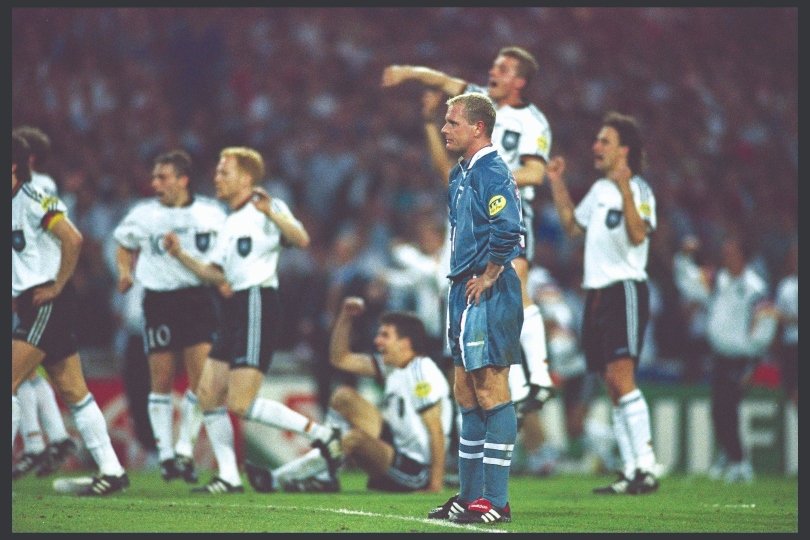
Gascoigne agreed: “If I was Alan Shearer, I’d have scored, because his instinct was to go straight towards the ball. I thought the keeper was going to get a touch, and I didn’t want to look stupid. I’ve watched many games I played in, but never that one. It’s too painful.”
“Every time I watch it, I think he’s going to get there,” says Ince. For his part, Venables revealed some two decades after the match that, “Most nights I have nightmares about it.”
Back in the moment, and without the melancholia of hindsight, Barry Davies was saying, “This is unbelievable stuff.” Extra time had featured more excitement in its opening 10 minutes than many games manage in 90 – and there was still time for Gascoigne and Anderton to go close before the change of ends. Ziege missed after the restart but then Germany retreated, especially after Helmer hobbled off, forcing midfielder Dieter Eilts to spend 10 minutes as a centre-half. Venables had no need for any substitutions, enforced or otherwise, across two energy-sapping hours.
England had taken on one of the best teams around and more than matched them. It was an era before stats were commonplace, but retrospective abacus-twiddlers declare that England had 55.5 per cent possession, and that 29.8 per cent of the play was in Germany’s third, compared to 21.1 per cent in England’s.
That was always likely, given Vogts’ tactics: half-imposed, half-chosen. But winners find a way to win – or at least take it to penalties.
England weren’t historically bad at penalties. True, they had lost their only competitive shootout that night in Turin, which is why the quarter-final win over Spain was cathartic for the nation, not just Stuart Pearce.
But this was before the spot-kick heartaches that tumbled down the decades: 2012, 2006, 2004, 1998 and – spoiler alert – 1996.
However, if England weren’t yet overawed by their own shortcomings, they were aware of Germany’s excellence. Having fluffed their first shootout in the Euro 76 Final, the Germans had profited in three successive World Cups. “We didn’t want it to go to penalties, because we knew the history,” says Ince. “Then again, we’d won the shootout against Spain, and we had Teddy, Shearer, Pearcey – enough capable players – so I wasn’t particularly concerned.” As Sheringham tells FFT, “We had some very good penalty-takers in the team. We were optimistic, especially with the first five.”
That confidence was not shared in the stadium. Even Des Lynam looked very slightly worried, saying, “Well, this is almost too much to ask of you. I wouldn’t mind if you ducked behind the sofa while this was going on.”
Once again, Shearer took the lead role. The 25-year-old placed the ball expertly into the top-right corner to set the tone for a shootout of almost universal technical excellence.
Thomas Hassler found the bottom-left corner. Platt followed Shearer to the top-right. Thomas Strunz, a late substitute, went top-left. At 2-2, up stepped Pearce: he went hard left and replaced his Spanish roar with a grin and thumbs-up. Stefan Reuter sent his top-right effort just past Seaman’s gloves; Gascoigne found the same corner; so did Christian Ziege.
And so, effectively, to sudden death.
England’s fifth penalty, the shootout’s ninth, came down to Sheringham, who’d been taken off before the shootout against Spain. “It must have been the most nervous I’d ever been on a football pitch,” he tells FFT. “You know that if you miss, you’re going to be remembered for it.” However, he had his own Jedi mind-trick: “I put the ball down, looked up and thought, ‘The keeper’s so small and that space up in the top corner is massive. There’s no way I can miss’.” And he didn’t. But neither did Kuntz. England needed new heroes to step forward.
“The manager asks, ‘Who fancies it?’” Shearer recalled of the pre-shootout wait. “Some guys put their heads down as if to say, ‘Don’t look at me’. I’m not going to tell you who they were. But Gareth put his hand up.” Ince did, too. “I looked at Southy and he said, ‘I’ll go six and you go seven’. We were confident in the five that were taking them. Then they all scored and you started thinking, ‘S**t, this is going to seven and eight.’”
Ince wouldn’t have to make the long walk, however – at least, not until the World Cup two years later. As agreed, Southgate went sixth, and he chose the same spot as Pearce had in Turin: low, to the goalkeeper’s right, but too central, with neither the power nor the placement to succeed. As Southgate turned to trudge back to halfway, the roars of German fans were quickly drowned out by thunderous applause from around Wembley.
Ince, who would endure his own 12-yard heartache in 1998, faced an inquisition from those who asked why a defender had taken the sixth penalty. “They just didn’t know the situation,” growls Ince. “I could have gone sixth and missed – I could have gone f**king seventh and missed. Penalties are a lottery, as long as you don’t miss the target. If you choose one way and the keeper makes the same decision... It bugged me that we should have won. It shouldn’t have got to penalties.”
Up stepped Moller. Eschewing the corners so expertly found by his colleagues and rivals, he leathered his shot above Seaman and into the roof of the net, before sprinting away and peacocking, his hands on his hips. While Moller disappeared under a delirious deluge, a tracksuited, typically tactful Klinsmann chose instead to console his old mate, Sheringham.
Venables quickly sprinted to catch up with Southgate; to hold the young man’s head up high and tell him that he had done his country proud. Hammering the point home, Southgate was led to a loudly-applauded lap of honour by his skipper, Tony Adams, who had his own demons to face. After white-knuckling his way teetotally through the tournament, Adams promptly went on a seven-week bender before acknowledging his alcoholism and entering rehab. More than 23 years later, he is still sober.
“When Gareth missed, it felt a bit like death must do,” said Venables. “It was the lowest point of my career. That was my chance to win a trophy for my country in front of our supporters.”
“It’s like, ‘Right, that’s it, it’s finished – you’ve got to go home’,” reflects Sheringham. “There was no, ‘Haven’t we got another chance? Who have we got to play on Saturday?’ It was, ‘No, you’re out of the tournament. That’s it.’”
“We knew that we would be playing the Czech Republic in the final and we knew that we had too much for them,” adds Ince. “That’s probably the worst thing when you get knocked out of these tournaments. We came away disappointed that we didn’t get to where we should have got to, because we should have won it.”
Others in the England camp have tried to take it in their stride. “The only regret is that Terry left,” said McManaman. “We didn’t build on it.” Despite the razzmatazz of the Premier League and promise of a Golden Generation, it would be 22 long years before England reached a semi-final again – led by a man who knew more than a little about pain.
The effects of England’s agonising defeat were wider and deeper, as Euro 96 marked a beginning and an end.
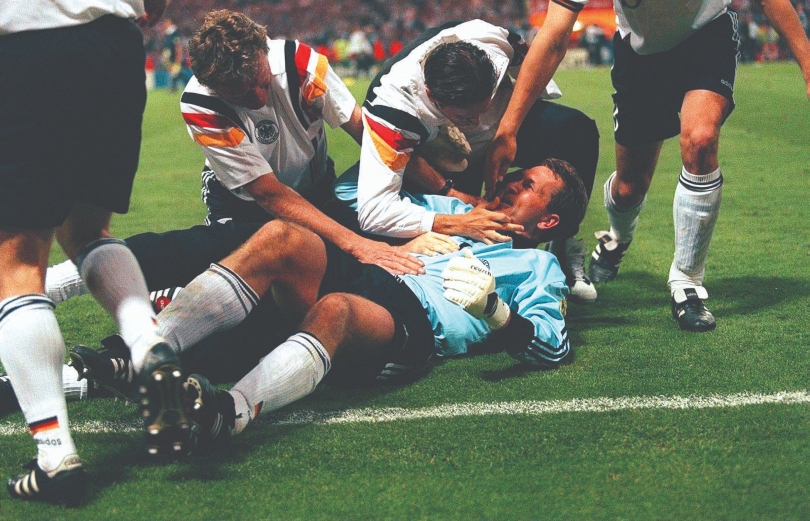
In the dying years of television’s near-total dominance of the media, an astonishing total of 26.2 million Brits watched this semi-final on the box. A sizeable majority of those chose the BBC, and were rewarded with Des Lynam putting the game in historical perspective: “You’d better remember where you were watching this tonight, because in 30 years’ time, somebody will probably ask you.”
It may also have been the moment English football accepted a new role and station. After decades of aloof arrogance artificially extended by a World Cup triumph on home soil, England had reached the semi-finals and lost by the proxy of penalties twice in the space of four tournaments – and this new type of heroic defeat was weirdly OK. It gave the country just enough room for tearful what-ifs rather than aggressive why-nots.
From here on, no matter how one-eyed the narrative about cheating Simeones, winking Ronaldos, lucky Ronaldinhos, wily Pirlos and the enemies within, from Phil Neville and David Beckham to the entire Euro 2016 squad, there was a wider acknowledgement from fans that England had no divine right to success – maybe a semi-final if they fulfilled their promise, but far worse if they didn’t.
Perhaps it was also due to the increasingly cosmopolitan Premier League demolishing islanders’ insularity. It’s difficult to assume inherent superiority if your star player is a Cantona, Zola, Henry or Torres – perhaps even less so if the manager is a Wenger, Mourinho, Benitez or Guardiola.
That multiculturalism wouldn’t come easy. There was violence as the suddenly-ended summer of love soon turned nasty. Idiots took their opportunity to live down to their reputation. However, hooliganism was a minority pursuit now shunned by a footballing class trying to move forward into a brighter future.
This feature first appeared in the February 2020 issue of FourFourTwo - get the latest issue now.
This is part six of this feature: Part 1 | Part 2 | Part 3 | Part 4 | Part 5







